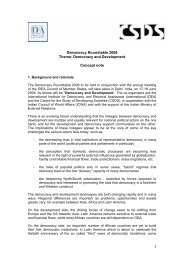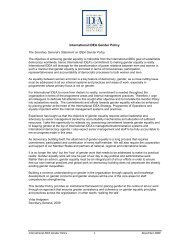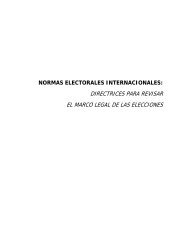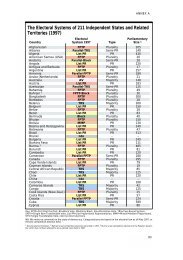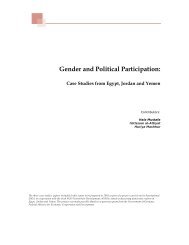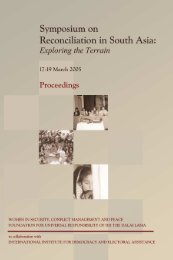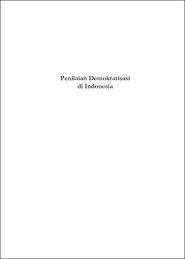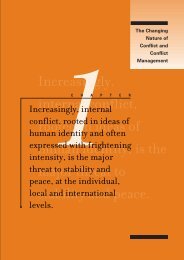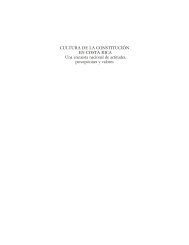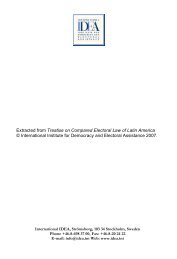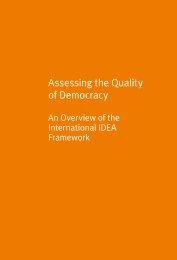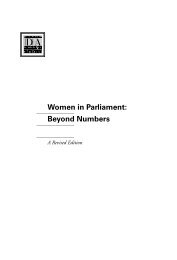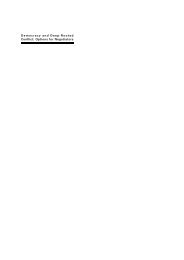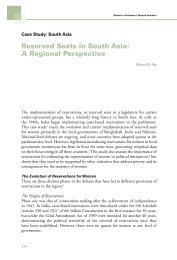The Role of State Constitutions in Protecting ... - International IDEA
The Role of State Constitutions in Protecting ... - International IDEA
The Role of State Constitutions in Protecting ... - International IDEA
You also want an ePaper? Increase the reach of your titles
YUMPU automatically turns print PDFs into web optimized ePapers that Google loves.
About the Authors<br />
About the Authors<br />
Otive Igbuzor is a Programme Co-ord<strong>in</strong>ator <strong>of</strong> Centre for Democracy & Development<br />
(CDD), an <strong>in</strong>dependent research, <strong>in</strong>formation and tra<strong>in</strong><strong>in</strong>g <strong>in</strong>stitution dedicated to<br />
policy-oriented scholarship on questions <strong>of</strong> democratic development and peace build<strong>in</strong>g<br />
<strong>in</strong> the West African sub-region. He also serves as the Secretary <strong>of</strong> Citizens Forum for<br />
Constitutional Reform (CFCR), a coalition <strong>of</strong> over one hundred civil society<br />
organizations committed to a process led and participatory approach to constitutional<br />
reform <strong>in</strong> Nigeria. Previously he was a lecturer at the Delta <strong>State</strong> University and has<br />
published many scholarly articles on democracy, health, gender, politics and development,<br />
and is currently complet<strong>in</strong>g his doctorate degree <strong>in</strong> Public Adm<strong>in</strong>istration specializ<strong>in</strong>g <strong>in</strong><br />
Policy Analysis. He also holds a degree <strong>in</strong> pharmacy. He was a found<strong>in</strong>g and lead<strong>in</strong>g<br />
member <strong>of</strong> many human rights and mass democratic organizations <strong>in</strong> Nigeria <strong>in</strong> the<br />
1980s and ‘90s.<br />
Cheryl Saunders holds a personal chair <strong>in</strong> law at the University <strong>of</strong> Melbourne and is a<br />
Director <strong>of</strong> the Institute for Comparative and <strong>International</strong> Law and the Centre for<br />
Comparative Constitutional Studies. She has specialist research <strong>in</strong>terests <strong>in</strong> constitutionmak<strong>in</strong>g<br />
and design, federalism, <strong>in</strong>tergovernmental relations and comparative<br />
constitutional law. From 1991-2000 she was Deputy Chair <strong>of</strong> the Australian<br />
Constitutional Centenary Foundation, established to assist broad public understand<strong>in</strong>g <strong>of</strong><br />
the Australian constitutional system and encourage public <strong>in</strong>volvement <strong>in</strong> constitutional<br />
debate. Other positions that she presently holds <strong>in</strong>clude first Vice-President, <strong>International</strong><br />
Association <strong>of</strong> Constitutional Law and Vice-President, <strong>International</strong> Association <strong>of</strong><br />
Centres for Federal Studies. In 1994 she was appo<strong>in</strong>ted an Officer <strong>in</strong> the Order <strong>of</strong><br />
Australia, for services to the law and to public adm<strong>in</strong>istration.<br />
Yogendra Yadav is the Director <strong>of</strong> the Institute for Comparative Democracy Lokniti, a<br />
research program <strong>of</strong> the Centre for the Study <strong>of</strong> Develop<strong>in</strong>g Societies (CSDS) <strong>in</strong> Delhi.<br />
Previously, Mr. Yadav taught political science at Punjab University, Chandigarh. He has<br />
written a series <strong>of</strong> academic papers on democratic politics and socialist discourse <strong>in</strong><br />
modern India. He also conducts live, nationwide television broadcasts on vote-count<strong>in</strong>g<br />
dur<strong>in</strong>g major elections <strong>in</strong> India. He writes regularly <strong>in</strong> H<strong>in</strong>di and is on the editorial board<br />
<strong>of</strong> the political magaz<strong>in</strong>e Samayik Varta. He is also coord<strong>in</strong>at<strong>in</strong>g South-South Exchange<br />
Programme on Democracy and Diversity; a programme <strong>of</strong> academic exchange between<br />
West African and South Asian scholars.<br />
Chao-Tzang Yawnghwe is an activist and advisor <strong>of</strong> the United Nationalities League for<br />
Democracy (UNLD), the Shan Democratic Union, the National Reconciliation Program<br />
(NRP), and Technical Assistance Network (TAN). He works with the various political<br />
fronts and organizations <strong>of</strong> Burma's democratic movement. After serv<strong>in</strong>g as a leader <strong>of</strong> the<br />
Shan resistance movement, <strong>in</strong>clud<strong>in</strong>g 14 years as a command<strong>in</strong>g <strong>of</strong>ficer <strong>in</strong> the field with<br />
the Shan <strong>State</strong> Army, he earned a Ph.D. <strong>in</strong> political science at the University <strong>of</strong> British<br />
Columbia. He has taught at the University <strong>of</strong> British Columbia and Simon Fraser<br />
University <strong>in</strong> Vancouver. He has published on Burma, issues <strong>of</strong> third world nationalism<br />
and development, and on modern social and political theory.<br />
52



